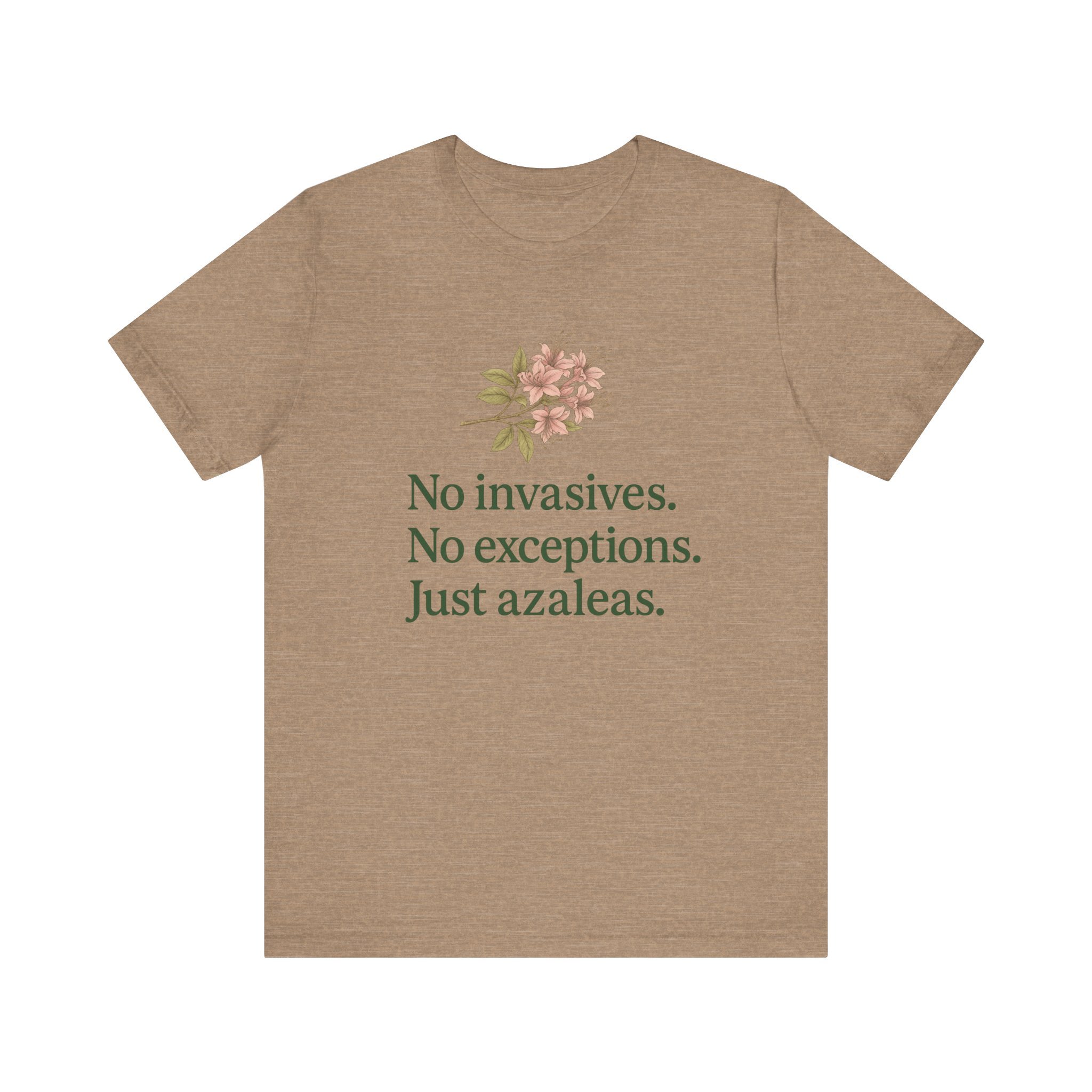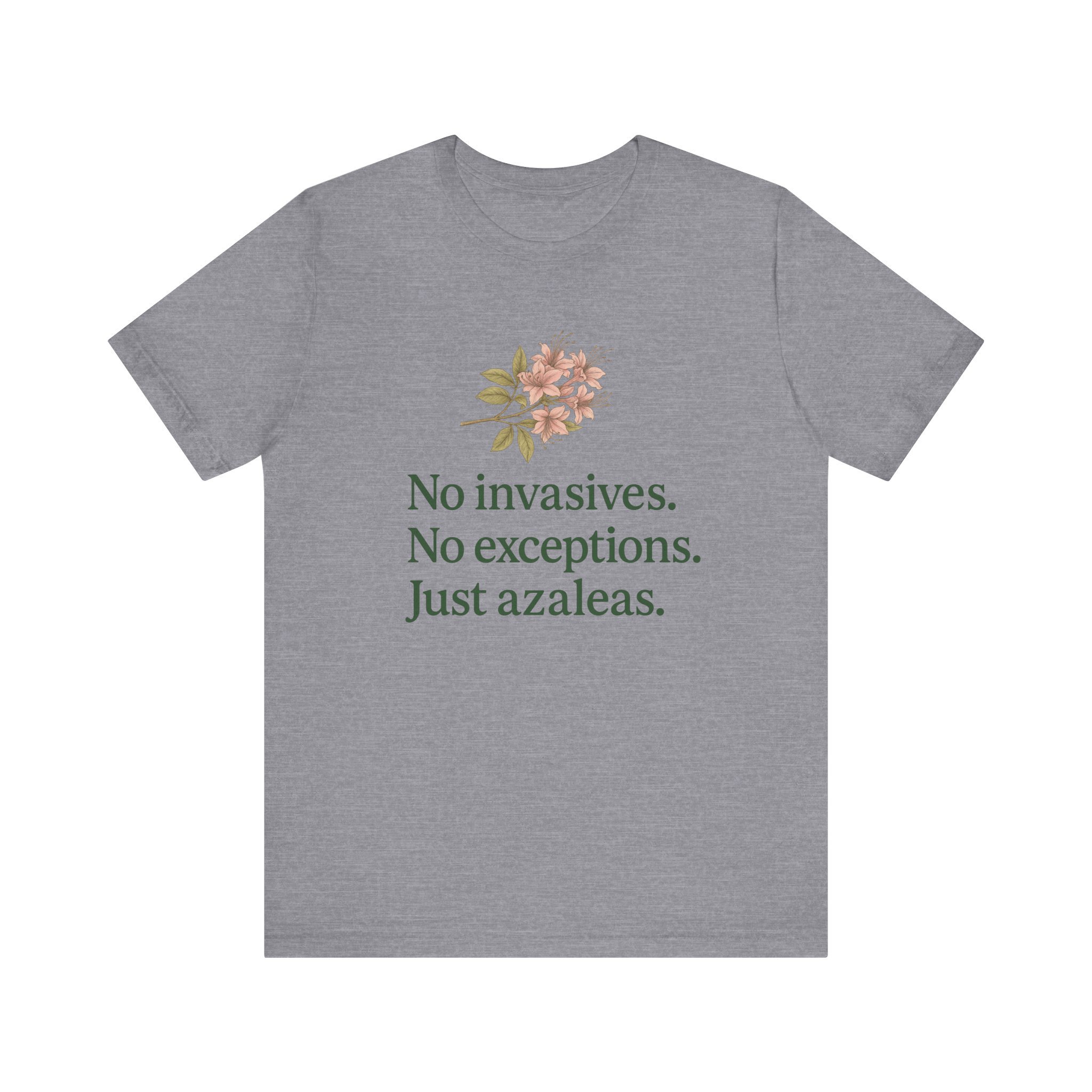America’s Wild Azaleas: The Native Beauties That Belong in Your Landscape
Forget the imports. The most breathtaking azaleas are already growing right here at home.
Introduction: Why Are Our Landscapes Full of Strangers?
Take a drive through most neighborhoods in the U.S., and you’ll likely spot a familiar scene: neatly trimmed azaleas bursting in pinks, purples, and reds every spring—planted in rows, tucked under foundation windows, or lining driveways. They're eye-catching. But here's the twist…
Most of those azaleas? They aren’t from here.
They’re alien species, mostly evergreen varieties bred from East Asian shrubs. These plants don’t support our local ecosystems, don’t provide the same wildlife benefits as our native flora, and often require more fertilizer, water, and pruning just to stay alive.
And yet—most people don’t even realize this.
We’ve all been taught—directly or indirectly—that **native plants are messy, boring, or unattractive.
Pink Honeysuckle azalea (R. canescens) buds bloom in spring, showcasing beautiful powder to vibrant pink hues!
🌿 A Closer Look at America’s Native Azaleas: Regions, Colors & Bloom Times
Across the Eastern United States—from the cool woodlands of Pennsylvania to the steamy ravines of the Deep South—you’ll find 17 to 18 species of native deciduous azaleas. Each one has its own unique bloom time, scent, color range, and habitat preference. But what unites them all is their value to pollinators and their deep roots in the landscapes they evolved with.
Let’s explore them by region, color, and season so you can find the perfect native azalea for your yard—or maybe five.
🌎 Native Azaleas by Region & USDA Zones
Pinxterbloom Azalea
Botanical Name: R. periclymenoides
Native Region: Mid-Atlantic to Southeast
USDA Zones: 4–9
Alabama Azalea
Botanical Name: R. alabamense
Native Region: Alabama, Georgia (dry woods & slopes)
USDA Zones: 6–9
Florida Flame
Botanical Name: R. austrinum
Native Region: Florida Panhandle, South AL, MS, GA
USDA Zones: 6–9
Flame Azalea
Botanical Name: R. calendulaceum
Native Region: Appalachian Mountains
USDA Zones: 5–8
Plumleaf Azalea
Botanical Name: R. prunifolium
Native Region: SW Georgia, SE Alabama (late bloomer)
USDA Zones: 5–9
Piedmont Azalea “Pink Honeysuckle Azalea”
Botanical Name: R. canescens
Native Region: Coastal Plain & Piedmont, SE U.S.
USDA Zones: 6–9
Swamp Azalea
Botanical Name: R. viscosum
Native Region: Eastern U.S. (wetlands, swampy areas)
USDA Zones: 4–9
Sweet Azalea
Botanical Name: R. arborescens
Native Region: Appalachians to New England
USDA Zones: 5–7
Roseshell Azalea
Botanical Name: R. prinophyllum
Native Region: Northeast & Midwest
USDA Zones: 3–8
Coastal Azalea
Botanical Name: R. atlanticum
Native Region: Atlantic coastal plain
USDA Zones: 6–9
Cumberland Azalea
Botanical Name: R. cumberlandense
Native Region: KY, TN, VA (rocky slopes, mountains)
USDA Zones: 5–8
Oconee Azalea
Botanical Name: R. flammeum
Native Region: Georgia & SC
USDA Zones: 6–8
Early Azalea
Botanical Name: R. australe
Native Region: South AL, MS, FL
USDA Zones: 7–9
Texas Azalea
Botanical Name: R. oblongifolium
Native Region: East Texas, Louisiana
USDA Zones: 7–9
Western Azalea
Botanical Name: R. occidentale
Native Region: Pacific Coast (CA, OR)
USDA Zones: 6–9Note: A few taxonomists debate whether certain species are distinct or variants—hence the “17 or 18” count!
🎨 Native Azaleas by Bloom Color
Looking to add just the right hue to your landscape? Here’s a quick guide:
Color Family Azaleas:
White: Alabama (R. alabamense), Swamp (R. viscosum), Sweet (R. arborescens)
Pink: Pinxterbloom (R. periclymenoides), Piedmont (R. canescens)
Yellow/Gold: Florida Flame (R. austrinum), Oconee (R. flammeum)
Orange: Flame Azalea (R. calendulaceum)
Red: Plumleaf (R. prunifolium)
Bi-color: Western Azalea (R. occidentale), Coastal (R. atlanticum)💡 Bloom colors can vary slightly depending on soil, elevation, and age of the plant.
📆 Bloom Time Guide
Native azaleas stretch their floral magic from late winter to late summer, depending on the species and your climate.
Early Spring: Pinxterbloom, Florida Flame, Piedmont Azalea
Mid Spring: Alabama Azalea, Coastal Azalea
Late Spring: Flame Azalea, Oconee Azalea
Early Summer: Swamp, Sweet, Roseshell, Cumberland
Late Summer: Plumleaf Azalea
Late Winter: Azalea (R. australe)
🌱 Where Native Azaleas Thrive (and Who They Love to Grow With)
Each native azalea has its own preferred conditions—some like it dry, some like it damp, and some love to dance in the dappled shade. Below is a guide to help you place the right azalea in the right place—plus native companion plants that will thrive alongside them and create a layered, wildlife-supporting display.
🔆 Azaleas for Dry Woodland Slopes & Part Sun
These species can tolerate well-drained, slightly dry soils, often thriving along ridges or sloped woodland edges:
Azaleas
Good Light
Native Companions
Flame Azalea (R. calendulaceum)
Dappled sun to part shade
Eastern Columbine (Aquilegia canadensis), Solomon’s Seal, Little Bluestem
Alabama Azalea (R. alabamense)
Part shade
Christmas Fern, Wild Geranium, Bluestar (Amsonia tabernaemontana)
Oconee Azalea (R. flammeum)
Part sun
Coreopsis, Woodland Phlox, Native grasses
Cumberland Azalea (R. cumberlandense)
Light shade/slopes
Wood Poppy, Foamflower, Eastern Shooting Star (Dodecatheon meadia)
🔧 Tip: These azaleas prefer acidic soil and benefit from a mulch of pine needles or leaf litter to mimic forest floor conditions.
Oconee Azalea Variety
The vibrant orange native azalea blooms with large, rich-hued flowers that enhance landscapes and provide wildlife habitat. Its impressive size, shown alongside my hand for scale, showcases this species' beauty.
💧 Azaleas for Moist or Streamside Conditions
These azaleas love humidity and consistent moisture—often thriving along creek banks, seeps, or rain gardens.
Azaleas
Moisture Level
Native Companions
Florida Flame (R. austrinum)
Moist, well-drained
Cinnamon Fern, Cardinal Flower, Virginia Sweetspire (Itea virginica)
Swamp Azalea (R. viscosum)
Wet soils
Swamp Milkweed (Asclepias incarnata), Buttonbush, Blue Flag Iris
Sweet Azalea (R. arborescens)
Moist, acidic soil
Golden Alexander, Sensitive Fern, Wild Blue Phlox
Western Azalea (R. occidentale)
Moist, cool sites
Western Bleeding Heart, Red Columbine (Aquilegia formosa), native sedges
🌸 Bonus: These are perfect for pollinator gardens near water features, and many have sweet, spicy, or lemony fragrance.
🌳 Azaleas for Deep Shade or Woodland Understory
Some native azaleas are perfectly happy with morning sun and afternoon shade, or even high, open forest cover where light filters through:
Light Needs & Native Companions
Pinxterbloom (R. periclymenoides)
Morning sun / shade
Woodland Stonecrop, Wild Ginger, Ferns (Lady Fern, Sensitive Fern), Trillium
Piedmont Azalea (R. canescens)
Light shade
Mayapple, Coral Honeysuckle (Lonicera sempervirens), Blue Woodland Phlox
Plumleaf Azalea (R. prunifolium)
Afternoon shade
Oakleaf Hydrangea, Ironweed (Vernonia spp.), Joe-Pye Weed, White Wood Aster
Coastal Azalea (R. atlanticum)
Dune scrub / open shade
Partridgeberry, Native Viburnum, Sweet Pepperbush (Clethra alnifolia)
💡 These azaleas are great for naturalized native plantings under oak, pine, or hickory trees, offering beauty without demanding full sun.
💐 Seasonal Bloom Strategy
Want blooms from March through August? Combine azaleas with staggered bloom times:
🌸 Early Spring: Florida Flame, Piedmont, Pinxterbloom
🌿 Mid–Late Spring: Flame, Alabama, Oconee
🌞 Early Summer: Swamp, Sweet, Cumberland
🔥 Late Summer: Plumleaf Azalea (the last native azalea to bloom!)
Pink Honeysuckle Azalea
As kids, we thought they were honeysuckles and tried to drink nectar from them. The Pink Honeysuckle Azalea, with its bright flowers, still charms with its beauty. This one grows wild by the same stream where I played as a child.
🌼 Why Native Azaleas Matter More Than Ever
(And How to Start Planting Them)
The landscapes we create today shape the ecosystems of tomorrow.
Every time we choose a native plant—especially a powerhouse like a native azalea—we’re helping to rebuild what’s been lost: habitat for butterflies and bees, nectar for hummingbirds, shelter for birds, and a deeper connection to place.
For decades, we’ve been taught that a “good” landscape is one that’s neat, tidy, and filled with exotic ornamentals that bloom for a week and offer little else. But that mindset has come at a cost: declining pollinators, sterile yards, and lost regional identity.
Native azaleas are the antidote to that.
They’re resilient, stunning, and deeply woven into the web of life in the U.S.—and when planted in the right place, they require less maintenance than imported species that were never meant to thrive here.
Here’s why they deserve a spot in your yard:
✅ They bloom when other plants don’t, offering nectar in early spring or deep summer.
✅ They evolved with our wildlife, providing natural food and shelter.
✅ They come in a kaleidoscope of colors, from soft blush to deep crimson.
✅ They are part of your region’s living legacy—rare, wild, and worth protecting.
You don’t have to rip out everything to make a difference.
Just start with one.
“The best time to plant a native azalea was 5 years ago. The second-best time is today.”
📥 Download the Native Azalea Quick Guide
Want a printable guide that shows bloom times, colors, zones, and growing conditions for all 17 native U.S. azaleas?
👉 [Click here to download your free copy]
Hang it on your greenhouse wall. Share it with a friend. Bring it to your next nursery trip.
Let it be your secret weapon for building a more beautiful and meaningful yard—one native azalea at a time.
🌿 About Plant Connections Unlimited, LLC
At Plant Connections Unlimited, LLC, we specialize in designing landscapes that are both beautiful and ecologically meaningful. We're not just about pretty yards—we’re about restoring balance, supporting native wildlife, and reconnecting people to nature through thoughtful, regionally appropriate planting.
As a licensed and bonded landscape horticulturist, founder Nikki brings over 20 years of hands-on experience in plant design, installation, and consulting. Whether you’re dreaming of a pollinator garden, a low maintenance landscape, or simply want to swap out invasive plants for something better—Plant Connections Unlimited can help.
We proudly offer:
Native landscape design (virtual & in-person)
Custom design plans tailored to your zone, light, and soil
Native plant education + digital resources
Consultations for homeowners, schools, businesses & communities
Our mission is simple: to connect people to plants with purpose.
Because nature knows what it’s doing—and when we plant natives, we’re helping restore that harmony.
📬 Contact Us
Nikki
Licensed & Bonded Landscape Horticulturist
📧 hello@plantconnectionsunlimited.com
🌐 www.plantconnectionsunlimited.com
Support Our Page and Show Your Love For Natives!
This is the perfect soft T for native plant nerds, rewilders, and folks who’d rather have a buzzing pollinator patch than a sterile lawn! Grab One for You and Your Bestie Today!













